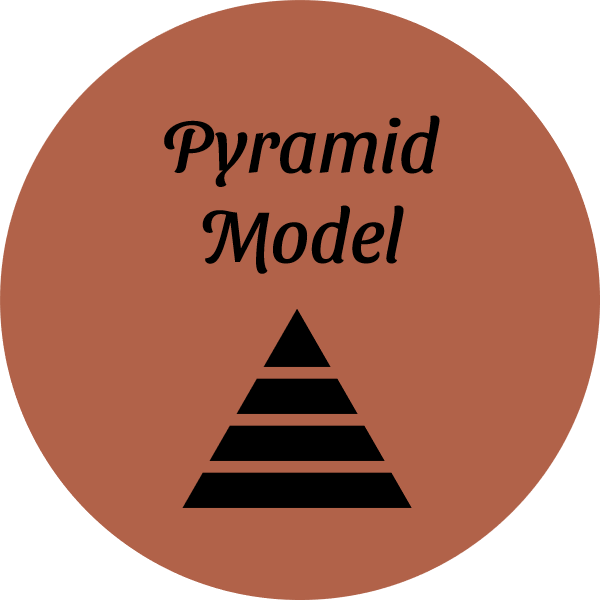
- Early Intervention
- STEM
- Math
- Coaching
- Coaching Quality
- Pyramid Model
-
Coaching Analysis Project

Background
The Pyramid Model is an approach to promoting social-emotional development and preventing and addressing challenging behavior in early childhood settings. See the National Center on Pyramid Model Innovations (NCPMI) for more information.
Publications
Williams, C. S., & Hardy, J. K. (2025). Transitions. In A. Hunter, M. L. Hemmeter, K. M. Bigelow, & N. M. Horen (Eds.), Unpacking the infant-toddler Pyramid Model: A practical guide for teachers and providers (pp. 83-93). Brookes.
Hardy, J. K., Mere-Cook, Y., Yang, H. W. (2024). Critical issues in measuring and teaching social problem-solving in early childhood research. Topics in Early Childhood Special Education. https://doi.org/10.1177/02711214241288214
Hemmeter, M. L., Snyder, P., Fox, L., Algina, J., Hardy, J. K., Bishop, C., & Veguilla, M. (2021). Corollary child outcomes from the Pyramid Model professional development intervention efficacy trial. Early Childhood Research Quarterly, 54(1), 204-218. https://doi.org/10.1016/j.ecresq.2020.08.004 https://doi.org/10.1016/j.ecresq.2020.08.004
Hardy, J. K., Santos, R. M., & Doubet, S. (2021).
Creating classroom environments that support young children (pp. 39-48). In
M.L. Hemmeter, M.M. Ostrosky, and L. Fox (Eds.), Unpacking the Pyramid
Model: A practical guide for preschool teachers. Brookes.
Hardy,
J. K., Hemmeter, M. L., Fox, L., & Ostrosky, M. (2021). Planning and
implementing transitions in early childhood classrooms (pp. 61-70). In M.L. Hemmeter, M.M. Ostrosky, and L. Fox
(Eds.), Unpacking the Pyramid Model: A practical guide for preschool
teachers. Brookes.
Hardy, J. K., & Milam, M. E. (2020, December). Make new friends: Promoting friendship and belonging. Webinar for the Military Families Learning Network: Intentional Design: Promoting Positive Behavior Webinar Series.
Hardy, J. K., & Schnitz, A. G. (2020, September). Let’s work together: Building relationships with families to support positive behavior. Webinar for the Military Families Learning Network: Intentional Design: Promoting Positive Behavior Webinar Series.
Hardy, J. K., & Kinder, K. A. (2020, June). Creating space: Arranging environments to promote positive behavior. Webinar for the Military Families Learning Network: Intentional Design: Promoting Positive Behavior Webinar Series.
Hardy, J. K. (2020, March). Behavior basics: Laying the groundwork for positive change. Webinar for the Military Families Learning Network: Intentional Design: Promoting Positive Behavior Webinar Series.
Hardy, J. K., & McLeod, R. (2020). Using positive reinforcement with young children. Beyond Behavior, 29(2), 95-107. https://doi.org/10.1177%2F1074295620915724
Hemmeter, M. L., Fox, L., Strain, P., Hardy, J. K., & Joseph, J. (2019). Designing and implementing Tier 2 instructional supports to promote social-emotional outcomes In J. J. Carta & R. M. Young (Eds.), Multi-tiered systems of support for young children: Driving change in early education, (pp. 131-152). Brookes.
Hemmeter, M. L., Fox, L., & Hardy, J. K. (2016). Supporting the implementation of tiered models of behavior support in early childhood settings. In B. R. Reichow, B. Boyd, E. Barton, & S. Odom (Eds.), Handbook of early childhood special education, (pp. 247-265). Springer Publishing Company.
Schachner, A., Belodoff, K., Chen, W-B., Kutaka, T., Fikes, A., Ensign, K., Chow, K., Nguyen, J., & Hardy, J. (2016). Preventing Suspensions and Expulsions in Early Childhood Settings: An Administrator’s Guide to Supporting All Children’s Success. SRI International: Menlo Park, CA. Accessed from http://preventexpulsion.org
Hemmeter, M. L., Hardy,
J. K., Schnitz, A. G., Adams, J. M., & Kinder, K. A. (2015). Effects of training
and coaching with performance feedback on teachers' use of Pyramid Model practices.
Topics in Early Childhood Special
Education, 35(3), 144-156. https://doi.org/10.1177/0271121415594924 https://doi.org/10.1177/0271121415594924
Hardy, J. K., Brown, J., Skow, K., & the IRIS
Center. (2015). Early childhood behavior management. Retrieved on
December 13, 2015 from http://iris.peabody.vanderbilt.edu/case_studies/ECBM.pdf
The IRIS Center for Training Enhancements. (2014). Early Childhood Behavior Management: Developing and Teaching Rules. Retrieved on March 25, 2015 from http://iris.peabody.vanderbilt.edu/module/ecbm/
Schnitz, A. G., Hardy, J. K., Artman, K. M., & Hemmeter,
M. L. (2013). Helping teachers implement the Pyramid Model using Practice-Based
Coaching [Monograph]. Young Exceptional
Children, 15, 95-110.